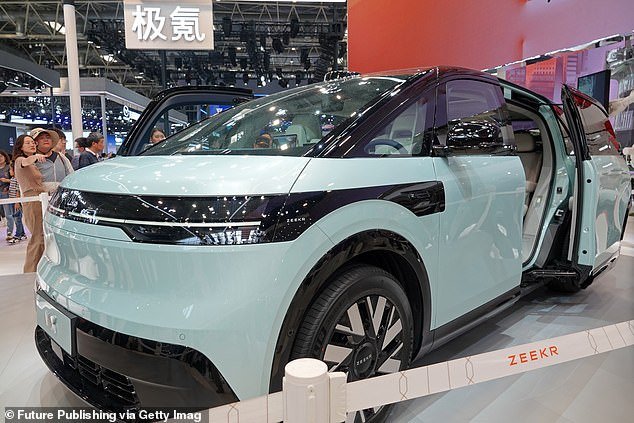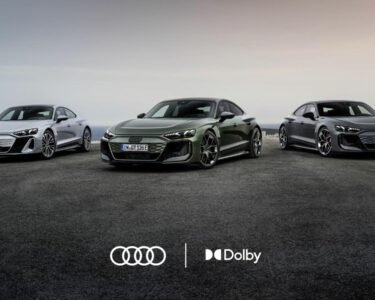In mid April, the showroom at New York’s Javits Center was filled with cars.
The glass-covered auditorium served as the venue for the New York International Auto Show, one of the premier showcases of American automaking.
Car companies unveiled three new vehicles for US production: the Subaru Trailseeker EV, the Kia EV4 and the Kia K4 Hatch, all the products of hundreds of millions of dollars in collective investment.
A month later, Chinese carmakers took over the China International Exhibition Center for the Beijing International Automotive Exhibition.
There were 71 new electric vehicles (EVs) on display among the 1,300 vehicles on the floor – many of which were built for the international market.
Chinese automakers are building cars for the entire world at a massive scale.
Their vehicles, built with subsidies from their government, are faster to produce, cheaper to assemble and more technologically advanced than most American cars, experts warned the Daily Mail.
Meanwhile, American companies and lawmakers are pulling back investments and regulations that kept their vehicles competitive. Experts are warning that these changes will badly hurt the US automotive sector’s global competitiveness.

The Zeekr Mix is a high-end two row minivan that received government subsidies – the company said it delivered over 200,000 units of the $40,000 car in 2024

Chinese vehicles have inspired a swell of consumer patriotism – the country is working to build up its manufacturing to export vehicles to the rest of the world
‘Chinese EVs tend to have more innovative features and generally push the boundaries when it comes to charging speeds, range and efficiency,’ Andrew Lambrecht, an EV analyst and industrial engineer, told the Daily Mail.
‘But their real benefit is the diversity of models and China’s ability to scale production.’
Their successes are starting to have real-world impacts for American companies. BYD, China’s biggest carmaker, just outsold Tesla in European sales for the first time.
Many upcoming Chinese cars look like Porsches or BMWs – they’re high-riding machines with thick, plush seats, oversized tires and cutting-edge battery technology.
Some charge to 80% in the time it takes Americans to fill a tank with gas, while others offer over 600 miles of battery range.
Chinese automakers can go from concept to production with these advanced models in under two years. In the US, that same process takes an average of five years.
Plus, China’s federal government is all-in on cars. The country’s Ministry of Industry and Information Technology – an entire federal wing that focuses on vehicle development – pours money and policy into the EV space.
State-owned manufacturers like SAIC get help with manufacturing, subsidies and receive EV credits to keep consumer prices lower.
‘Simply put, China is an industrial engineering and manufacturing powerhouse,’ Lambrecht said.

Ford’s abandoned Highland Park factory in Michigan

Li Auto, one of China’s premier vehicle manufacturers, has developed several low-cost, high-tech vehicles in the Chinese market

Lei Jun, the co-founder and CEO of Xiaomi, built a technical empire in China with phone sales before switching to luxury EVs
Meanwhile, American lawmakers are scaling back billions of dollars worth of subsidies that initially made US-built cars more competitive with those coming out of China.
While the average new EV in the US still sits north of $48,000, Lambrecht notes that price parity is slowly improving thanks to American federal incentives.
American lawmakers have voted to revoke EV tax credits and emissions regulations that fight against China’s subsidies with equal weight.
In America, the Chevrolet Equinox EV – one of the most tech-forward, low-cost vehicles in the US market – costs $27,495 with the $7,500 tax credit. That’s less than a gas powered Equinox at $29,995.
‘That’s a win for government incentives and policy if you’d ask me,’ Lambrecht said.
Plus, tariffs are making cars more expensive.
American automakers have warned that they’re spending billions of dollars on tariffs as they attempt to make globally competitive cars. GM, the parent company of Chevy, said it expects to shell out between $4 billion and $5 billion in tariff costs by the end of 2025.
Chevy’s Equinox EV, which employs hundreds of Americans who refine the car’s tech and development, is built in Mexico.
The foreign assembly makes the entire car eligible for Trump’s 25% automotive tariffs, and threatens its low starting price.
But while the US fights with its own pricing issues, Chinese manufacturers are fine-tuning their cars.
‘The whole Chinese market is getting more mature. But instead of big leaps with brand new models, they’re developing refinement,’ Kevin Williams, a journalist with InsideEVs, said after going to the Beijing show.
‘These are slower updates. But slow in this context is a lot faster than all Western car companies.’

In New York, only three vehicles launched during a premier auto show: the Kia K4 Hatch was the only gas-powered vehicle that revealed

Xiaomi’s YU7, a Tesla competitor with styling that rivals Porsche, just hit consumer showrooms in late May

BYD, China’s biggest carmaker, is starting to sell more cars internationally – it just outpaced Tesla in Europe
Electric cars built in China are already being exported to Europe, Southeast Asia, Latin America and the Middle East.
Many of these countries have maintained their climate goals and are hoping to pack their economies with cheap, non-tailpipe emissions cars.
Analysts worry that America’s backtracking on EVs will make our manufacturers less competitive in this multi-billion-dollar market.
‘The United States doesn’t seem to have much of a long-term auto-manufacturing strategy, but rather a short-term one,’ Bill Pierce, a car expert at EVinfo.net told the Daily Mail.
‘While it’s wise not to over-extend into US EV production if the demand isn’t there, it’s not wise to pull back so much on plans that the future of the car companies is in peril.’
There might be some solutions, though, for the US market.
Slate, a new startup promising low-cost EV pickup trucks, is hoping to build 100,000 units of its $25,000 car for American consumers after 2026.
The company hasn’t said if it is looking to enter the international market that China is aiming to dominate.
Jeremy Snyder, chief commercial officer of the newly-unveiled Slate electric truck company, told the Daily Mail that US EV manufacturing is a no-brainer.
‘Building EVs for a new company is the only obvious solution,’ he said.
‘We expect to be a massive powerhouse in the industry that continues to give people what they’re looking for in a vehicle.’




